Indiana University School of Medicine Dean Jay Hess, MD, MHSA, presented the IU School of Medicine 2030 Strategic Plan and gave an update on the state of the school during the Spring All School Meeting on May 2. In case you missed it, here are highlights from school leadership in the missional areas of education, research and clinical care.
SCHOOL LEADERSHIP
Over the last year, IU School of Medicine has recruited top leaders for several departments:
- David Rosmarin, MD, Dermatology—started in January 2023 and came from Tufts Medical Center in Boston where he was vice chair for education and research
- Michael Feldman, MD, PhD, Pathology—started in February 2023 and came from the University of Pennsylvania’s Perelman School of Medicine where he served as vice chair for clinical services and director of pathology informatics in the Department of Pathology and Laboratory Medicine
- Timothy Corson, PhD, Pharmacology & Toxicology—started April 1 and previously served as vice chair for basic and translational research in the Department of Ophthalmology at IU School of Medicine, with joint appointments in Pharmacology/Toxicology and the Department of Biochemistry and Molecular Biology

Interim chairs for two departments:
- Stephanie Ware, MD, PhD, Medical and Molecular Genetics—professor of pediatrics and medical and molecular genetics; Director of the Cardiovascular Genetics Program in the Wells Center for Pediatric Research
- Deanna Willis, MD, MBA, Family Medicine—professor of Family Medicine who stepped up when Kevin Gebke, MD, was named senior vice president for community medicine at IU Health last September
 Regenstrief Institute CEO & President
Regenstrief Institute CEO & President
Rachel Patzer, PhD, MPH, is an epidemiologist who previously was Director of Health Services Research Center at the Emory University School of Medicine. She has focused her career on improving access to health care and improving outcomes—with a major focus on health equity in renal transplantation.

Senior Executive Advisor to the Dean
Neil Perdue, PhD, comes to IU School of Medicine from the University of Indianapolis, where he was executive vice president and chief strategy officer. He will support the school in a number of roles, including oversight of the implementation and monitoring of the strategic plan.
Executive Associate Dean for Equity and Inclusion & Chief Diversity Officer

Chemen Neal, MD, has served as chair and co-chair of the IU School of Medicine Diversity Council since 2015, and previously served as director of holistic student success and advocacy, as well as the director of wellness for the Department of Obstetrics and Gynecology. She will lead the new Center for Inclusive Excellence and work closely with leaders across the organization to advance strategic priorities in diversity, equity, inclusion and justice for students, trainees, faculty and staff.
2023 STRATEGIC PLAN
The IU School of Medicine Strategic Plan is part of the broader IU 2030 Strategic Plan. This will be the roadmap for the school to advance excellence in all of its missions while supporting Indiana University’s strategic goals of Student Success and Opportunity, Transformative Research and Creativity, and Service to Our State and Beyond.
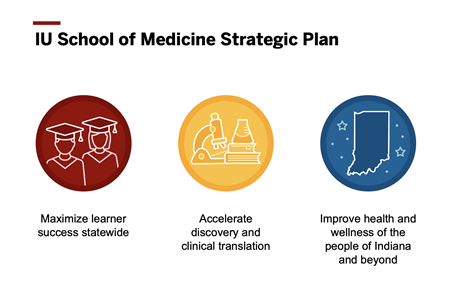 The IU School of Medicine Strategic Plan also has three pillars:
The IU School of Medicine Strategic Plan also has three pillars:
- Maximize learner success statewide
- Accelerate discovery and clinical translation
- Improve health and wellness of the people of Indiana and beyond
Cross-cutting themes include:
- Uphold IU School of Medicine’s core values of excellence, respect, diversity, integrity and cooperation
- Promote health, wellness and engagement of our people
- Communicate effectively, regularly and bidirectionally
- Use data to make better decisions
- Increase diversity and ensure an inclusive, welcoming and supportive environment for all
EDUCATION
Maximize learner success statewide
Goals:
- Maintain on-time graduation rate for all learners
- Ensure learners are well prepared for the next professional transition
- Define academic outcome metrics and exceed national benchmarks for each degree program
- Maintain student debt at or below median relative to peer institutions
- Increase learner satisfaction with educational experience
Predictors of Student Outcomes
One example of how IU School of Medicine is using data to inform student success is the Predictors of Student Outcomes (POSO) project. POSO uses data to predict which entering medical students could benefit from extra support. They are invited to a pre-matriculation program and helped by advisors trained in student success.
The pre-matriculation program happens the summer before year 1 and involves coursework to help with study skills, test-taking in large volume learning environments, and professional identity formation. The outcomes have been excellent. No one who has gone through the pre-matriculation program has failed a course.
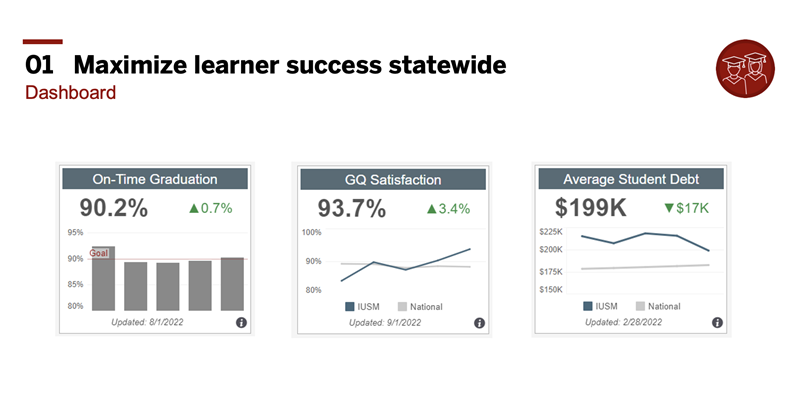
Dashboard
- More than 90 percent of IU School of Medicine students are currently graduating on time.
- Based on the Graduate Questionnaire, 93.7 percent are satisfied with their medical education–above the national average of 89 percent satisfaction.
- One metric the School would like to improve is the average debt graduating medical students carry. IU School of Medicine is pursuing strategies, including financial advising, ensuring on-time graduation and endowing new scholarships.
Match Day Results
IU School of Medicine celebrated a historic Match Day on March 17, with a nearly perfect 99.7 percent of fourth-year medical students successfully matching to residency programs across the nation.
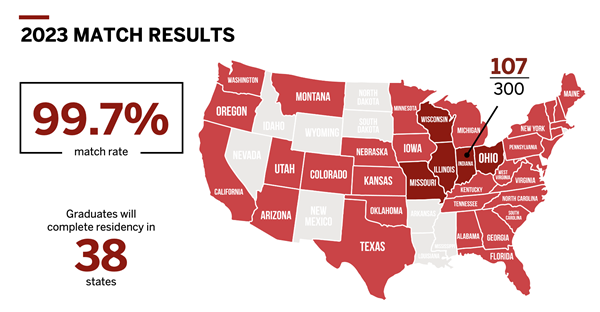
- 354 students matched into programs in 38 states, including places like Stanford, Washington University and Johns Hopkins
- 107 graduates are staying in IU School of Medicine and IU Health residency programs
- IU School of Medicine graduates excel in residency. The AAMC Residency Readiness Survey Project showed that during the first six months of residency, 98 percent of IU School of Medicine graduates meet or exceed overall performance expectations, as reported by their residency program directors.
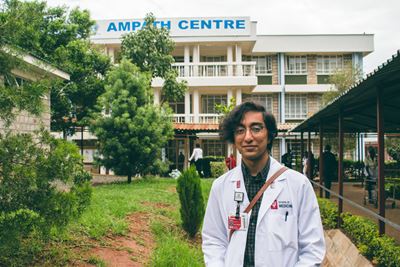 AMPATH Kenya
AMPATH Kenya
While IU School of Medicine provides a consistent and uniformly high-quality curriculum across all nine campuses, the school offers unique ways for students to tailor their educational experience. This was the first year since COVID that medical students were welcomed back to Kenya to do rotations and research through the AMPATH partnership with Moi University School of Medicine.
- Since the program began in 1989, more than 550 IU School of Medicine students have participated in the AMPATH Kenya educational exchange.
- Almost 350 Moi University medical students have completed rotations at IU or other AMPATH Consortium institutions.
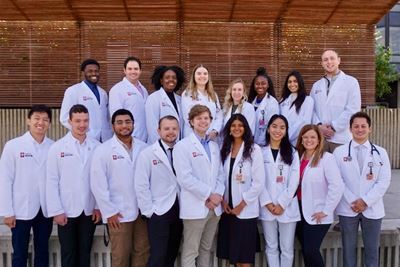
Urban Medicine
Medical students also can tailor their experiences through one of 17 Scholarly Concentration Programs. For years, IU School of Medicine has offered a Rural Medicine track in Terre Haute, and now there is a new Urban Medicine Program at IU School of Medicine-Northwest-Gary, addressing health care disparities and social determinants of health of urban populations.
Stairway to Accreditation
IU School of Medicine’s reaccreditation process is now underway. The Liaison Committee on Medical Education (LCME) accredits established medical schools on an eight-year cycle. IU School of Medicine’s Accreditation and Continuous Improvement team is preparing to launch the school's self-study this summer. A site visit from the LCME survey team is expected in the Spring of 2025.
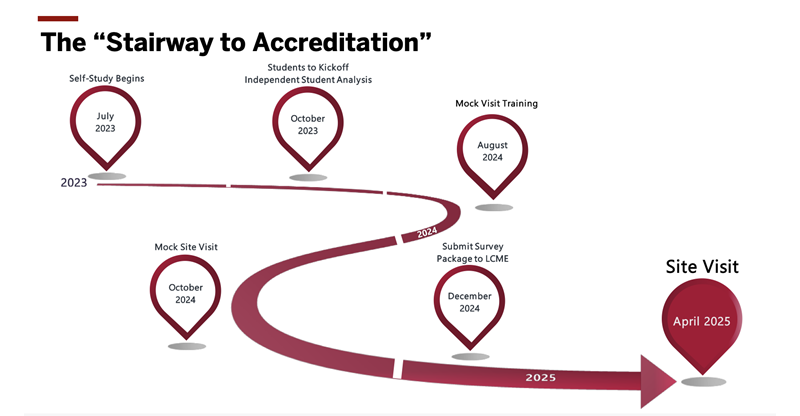
Medical Education and Research Building
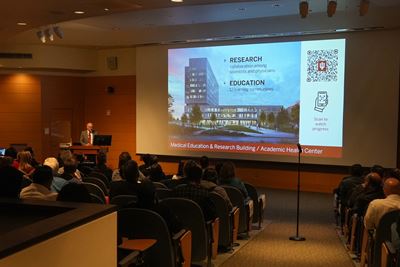 Now under construction, the new Medical Education and Research Building will help IU School of Medicine advance all of its strategic priorities. The project is on time and on budget, with an opening set for 2024. See the progress via webcam.
Now under construction, the new Medical Education and Research Building will help IU School of Medicine advance all of its strategic priorities. The project is on time and on budget, with an opening set for 2024. See the progress via webcam.
The new facility includes:
- New classroom space–the first to be added on the Indianapolis campus since 1959
- 12 learning communities aimed at making the largest medical school in the country feel smaller and more supportive
- Flexible classrooms and simulation centers
- Research Tower with collaboration spaces, wet and dry labs, and the latest technology
- Atrium with gathering space for larger events including community events and walking paths to help promote wellness
RESEARCH
Accelerate Discovery and Clinical Translation
Goals:
- Increase the impact of scientific discovery and clinical translation
- Increase NIH funding to be in the top 10 public medical schools by 2030
- Create a balanced research portfolio encompassing basic discovery, global health, health equity research, and clinical research.
- Increase the number and diversity of patients enrolled in clinical trials
- Increase the national recognition of our faculty and staff
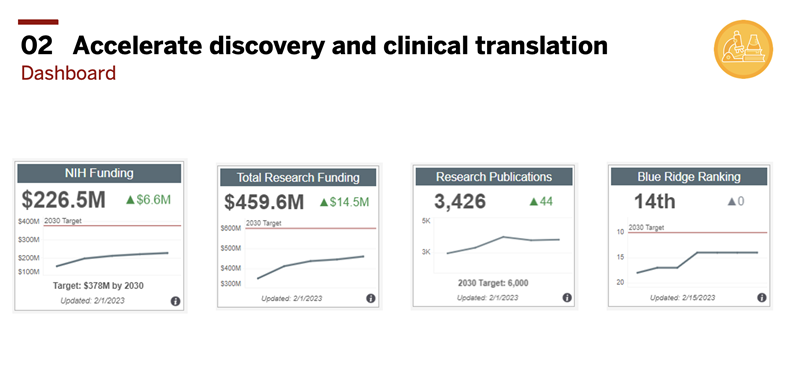
Dashboard
- IU School of Medicine is 14th on the Blue Ridge Rankings for Public Medical Schools (target of Top 10)
- For the calendar year ending December 2022, total NIH funding was about $227 Million
- Total research funding is $460 Million (target of $600 million)
- Research publications are at 3,426 (target of 6,000)
Departments ranked in the Top 20:
- Medical and Molecular Genetics
- Pediatrics
- Biostatistics & Health Data Science
- Obstetrics and Gynecology
- Anatomy, Cell Biology & Physiology
- Otolaryngology
- Emergency Medicine
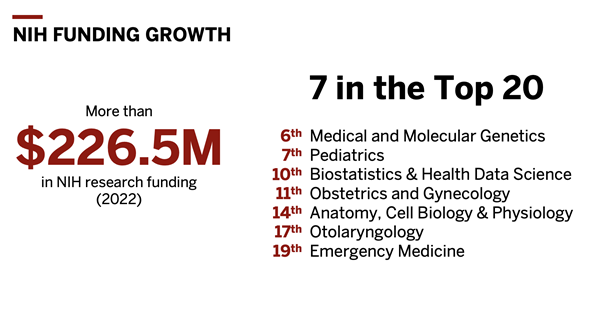
Research Growth Plan
Last fall, IU School of Medicine asked ECG Consultants to help the school develop a Research Growth Plan. Final recommendations were received in January, helping IU School of Medicine to develop a strategic roadmap specifically focused on research space.
Key recommendations:
- Full integration of clinical research into the Adult Academic Health Center (AAHC)
- Research Space (wet lab, dry lab, collaboration)--Completion of the Education & Research Building in 2024 will create opportunities to renovate existing education space to make more research space.
- Laboratory Animal Resource Center (LARC)--Expanding laboratory animal capacity will be essential to achieve the school’s NIH funding goal.
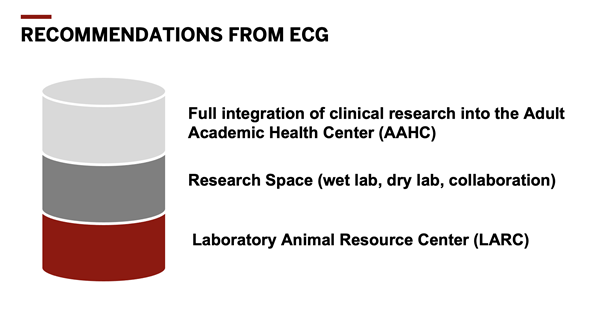
RESEARCH HIGHLIGHTS
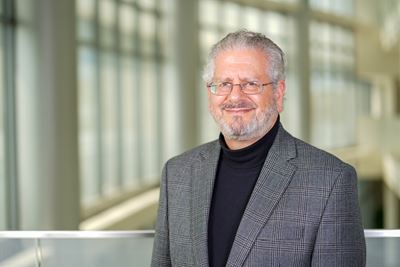 Alzheimer’s Disease
Alzheimer’s Disease
IU School of Medicine’s top-funded research programs are in Alzheimer’s disease–one of the school’s major areas of expertise.
- MODEL-AD (the NIH center for mouse models for research)
- TREAT-AD (one of two NIH drug discovery centers)
- NCRAD (the NIH’s national repository for biological samples in neurodegenerative diseases)
A new Alzheimer’s Initiative—CLEAR-AD is a five-year, $41 million study led by Andrew Saykin, PsyD, and is a partnership with Mayo Clinic Florida to better understand biological pathways of Alzheimer’s and ultimately create imaging and fluid biomarkers for the early detection and progression of disease in a diverse population.
Clinical and Translational Sciences Institute
The Indiana Clinical and Translational Sciences Institute (CTSI) has secured nearly $38 million in renewed funding from the NIH for the next seven years—the fourth consecutive successful renewal of this grant. The CTSI is a partnership among Indiana’s top research universities—Indiana University, Purdue University, Notre Dame—and the Regenstrief Institute.
Bioinformatics
New bioinformatics software has been developed to help identify rare genetic variants in the genome by a team led by Dr. Zilin Li, PhD, a researcher in Biostatistics and Health Data Science.
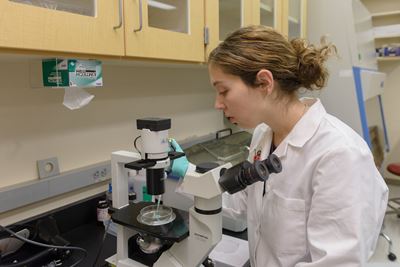 Diabetes research
Diabetes research
IU School of Medicine research contributed to development of the first drug to delay the onset of Type 1 diabetes by an average of almost three years. Researchers with the Center for Diabetes and Metabolic Diseases (CDMD) and the Herman B Wells Center for Pediatric Research at IU School of Medicine helped conduct clinical trials and led the data collection and analysis of the drug.
CLINICAL CARE
Improve health and wellness of the people of Indiana and beyond
Goals:
- Work with IU Health to improve community health in prioritized areas including infant and maternal mortality, hypertension, mental health and addiction and smoking cessation.
- Work to increase focus on promoting health equity through our education, research and clinical care missions.
- Work with IU Health to align destination clinical services with research priorities.
- Work with IU Health to integrate principles of precision health into clinical care.
- Increase diversity of faculty, staff and learners so IU School of Medicine reflects state demographics.
- Improve health of IU School of Medicine faculty, staff and learners
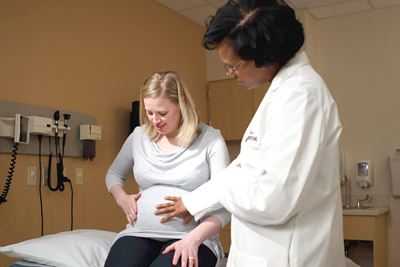 Health Equity Research and Engagement (HERE)
Health Equity Research and Engagement (HERE)
HERE is a new collaborative initiative between IU Health and Community Health. This is an effort to mitigate disparities in three key areas:
- Cardiovascular Health
- Maternal and Infant Health
- Behavioral Health
There are several programmatic efforts underway, including:
- iHEART is a collaborative program aimed at reducing health inequities that contribute to overall heart disease and cardiovascular health by deploying Community Health Workers (CHWs) to screen, refer and treat individuals in three medically underserved areas of Indianapolis: Meadows/Martindale-Brightwood, the United Northwest Area/Riverside and the Near Southeast Side.
- The WeCare program in Marion County targets the 13 highest risk ZIP codes for infant mortality. Trained CHW coaches connect pregnant women and new mothers to resources addressing social determinants of health, and educate parents on the importance of safe sleep practices and breastfeeding, smoking cessation, and nutrition, etc., to mitigate risk for infant death.
- Cradle Indy is a collective action, community-engaged approach to addressing infant mortality. Modeled after Cradle Cincy, a successful collaboration among parents, caregivers, health care professionals and community members which reduced infant mortality by 20 percent in less than 10 years, the program was launched earlier this spring and will serve to convene and coordinate community partnerships to address and overcome social, structural and medical drivers of infant mortality.
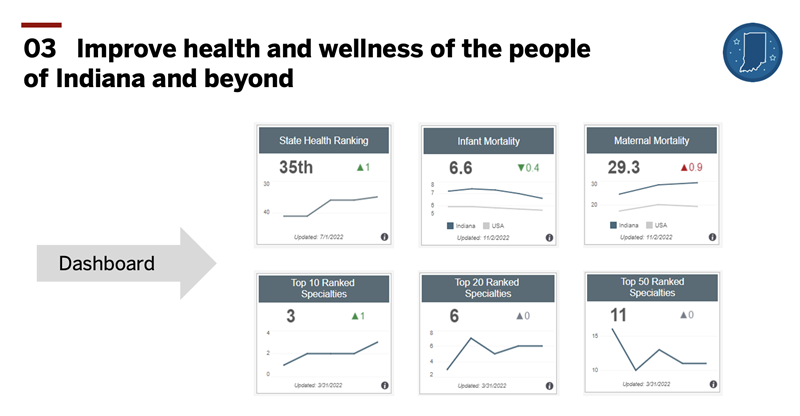
Dashboard
Indiana’s Overall Health Ranking is 35th of the 50 states. The School of Medicine wants to help the state improve.
- Indiana’s Infant Mortality Ranking
- Current: 6.6 (per 1,000 live births)
- Target: 15% reduction = 5.61
- Indiana’s Maternal Mortality Ranking
- Current: 29.3 (per 100,000 live births)
- Target: 15% reduction = 25.9
- IU School of Medicine and IU Health currently have three pediatric specialties ranked in the Top 10 and six in the Top 20. Only one adult specialty is ranked in the Top 50. The School is working to improve that.
IU School of Medicine has many outstanding clinicians and clinical support staff who are working hard to improve the health of Indiana citizens every day. Here are some highlights of the many ways the School is keeping Hoosiers healthy.
Krannert Cardiovascular Research Center
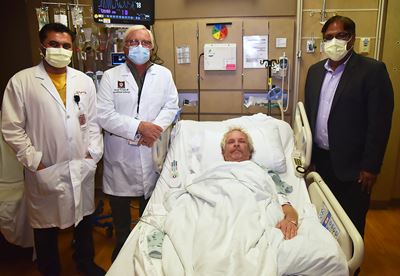
In December, the first patient was enrolled in a groundbreaking clinical trial at IU studying the effectiveness of a new treatment for patients who experience bleeding of the heart muscle following acute heart attack. The study—led by Keyur Vora, MD, MS, George Revtyak, MD, and Rohan Dharmakumar, PhD—aims to determine if treatment using the drug deferiprone to remove the residual iron within the damaged heart can lead to better outcomes. This is the first clinical trial to focus on this common cardiovascular complication and has the promise of decreasing patients’ risks for long-term heart failure.
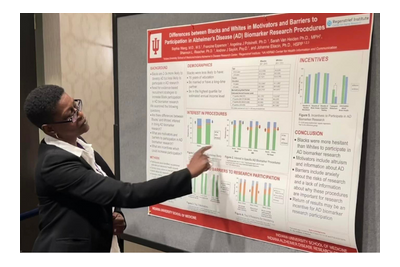 Indiana Alzheimer’s Disease Research Center
Indiana Alzheimer’s Disease Research Center
Francine Epperson, outreach and engagement specialist with the IADRC, has been a staff member with IU School of Medicine for more than 30 years. Her work has contributed to a 20 percent increase in clinical trials among Black and African American participants. This will help to answer questions about why Black adults are nearly twice as likely to develop Alzheimer’s as white adults.
Anti-racism: Sickle Cell Story Club
In the Department of Pediatrics, Julia LaMotte, PhD, developed anti-racism curriculum for residents and fellows. She also started the Sickle Cell Story Club at Riley Hospital so sickle cell patients—95% of whom are Black or African American—can access books featuring Black protagonists.
Academic Clinician Cluster Hiring Initiative
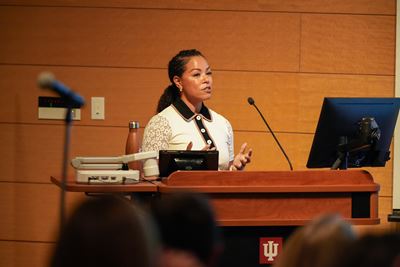 Chemen Neal, MD, executive associate dean for equity and inclusion and chief diversity officer, presented a new hiring initiative that focuses on inclusion and belonging. This is a collaboration which includes the Office of Faculty Affairs and Professional Development and the Office of Research Affairs along with IU Health partners.
Chemen Neal, MD, executive associate dean for equity and inclusion and chief diversity officer, presented a new hiring initiative that focuses on inclusion and belonging. This is a collaboration which includes the Office of Faculty Affairs and Professional Development and the Office of Research Affairs along with IU Health partners.
This initiative will augment other diversification initiatives including iDREAM, PLUS, the Strategic Research Initiative (SRI) and the IU Presidential Diversity Hiring Initiative targeting physician and non-physician faculty. This is a $5 million investment in 20 new faculty over four years. Coupled with the strategic plan, this initiative will assess climate and build inclusive excellence statewide.
IU School of Medicine will offer four or five career development tracks. The tracks currently being considered are:
- Clinician educator
- Clinician scientist
- Health informatics specialist
- Primary Care Physician to health systems leader
The finalized plan will be announced in the summer of 2023 with a “go live” date of September 1, 2023.
FACULTY
2023-24 Faculty Elections
Results of IU School of Medicine faculty elections were announced at the Spring All School Meeting. Ashley Inman, MD, is present-elect, and Matthew Landman, MD, is secretary-elect. Full faculty election results may be found on the faculty affairs and professional development website.
Trustees Teaching Awards
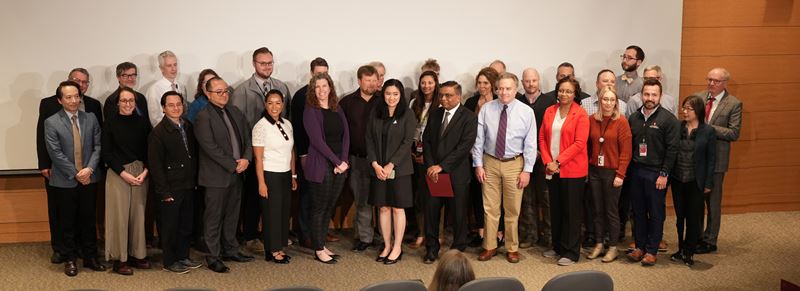
The Indiana University Board of Trustees established this award to recognize outstanding teaching. The Trustees Teaching Award winners are chosen by the Teaching Awards Committee, which is chaired by Ruben Hernandez, MD. Nominations were solicited from students, residents and faculty. Honorees for 2023 are:
- Mohammad Abu Zaid, MD
- Cole Beeler, MD
- Tanna Boyer, DO, MS
- Megan Bybee, MSED
- Maryann Chimhanda, MD, MS
- Rachel Day, MD
- Andrew Deane, PhD
- Angela Delecaris, MD
- Julie Dunlap, MD
- Kenneth Dunn, PhD
- Michael Eadon, MD
- Nabil Fayad, MD, MS
- Grant Gilroy, DO
- Jonathan Guerrero, PharmD
- Anita Haggstrom, MD
- Amir Hajrasouliha, MD
- Doris Hardacker, MD
- John Holden, MD
- Emily Holmes, MD, MPH
- Rachel Hursh, MPH
- Erik Imel, MD
- Heba Ismail, MBBCH, PhD
- Upasana Jarori, MD
- Lim (Kok) Kua, MD
- Alex Lion, DO
- Bruce Martin, PhD
- Matthew Mellon, MD
- Ray Munguia-Vazquez, MSC, PhD, MD
- Chemen Neal, MD
- April Newton, MPT, DPT, MA
- Carl Pafford, MD
- Aimee Patel, MD •
- Damien Patel, MD
- Neha Patel, MD
- Nicholas Pettit, DO, PhD
- Nathan Prahlow, MD
- Raheleh Rahimi, MD
- Ryan Relich, PhD
- Paris Roach, MD
- Christopher Robinson, PhD
- Andrew Rodenbarger, MD
- Lynn Roy, MS, PhD
- Zeb Saeed, MD
- Gattadahalli Seetharam, PhD
- Kevin Shiue, MD
- Anjan Sinha, MD
- Jason Spaeth, PhD
- Diana Summanwar, MD
- Nucharin Supakul, MD
- Tim Sutton, MD, PhD
- Jennifer Taylor, DHEd, MPH
- Evan Templeton, MD
- John Turchi, PhD
- Juan Carlos Venis, MD, MPH
- Clark Wells, PhD
- Isaac Wu, MD
- Elizabeth Yeh, PhD
- Jimmy Yen, PhD, MS
- Xinna Zhang, PhD
